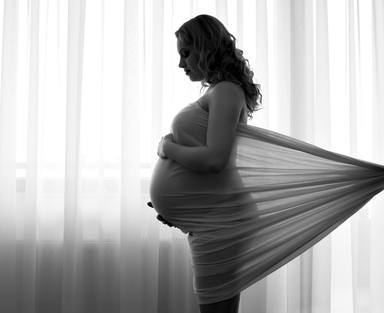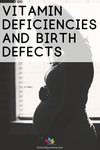 There are many different types of birth defects, nearly all of which cause life-long development issues and possibly even death.
There are many different types of birth defects, nearly all of which cause life-long development issues and possibly even death.
Sadly, nearly eight million babies are born with birth defects each year. These developmental issues are the leading cause of infant mortality; in fact, it’s been reported that 270,000 babies die within the first month of life because of their birth defects.
All these statistics are devastating, but there is one glimmer of hope; researchers have been able to pinpoint the exact cause of 50% of all birth defects. That means new parents can take the necessary steps to prevent these unfortunate conditions.
Among the known causes of birth defects, poor prenatal nutrition is the leading instigator of development issues. Therefore it is widely recommended that every woman who plans or is likely to get pregnant takes a high-quality prenatal multivitamin. I recommend USANA's Prenatal CellSentials as it is highst quality supplement and contains many beneficial ingredient at a right dose and in the bio-available form.
Defects Caused by Deficiencies
Many birth defects are the direct result of the mom’s vitamin deficiency during pregnancy. Here are some of the most common defects cause by deficiencies.
Congenital Heart Disease
Babies often sustain abnormalities in their cardiovascular system before birth. These might include heart valve defects, holes in the heart walls, and even heart failure.
These types of birth defects are caused by various things, including a deficiency in vitamin B2 (riboflavin) and vitamin B3 (niacin).
Gastroschisis
A baby might have a tear or fissure in the abdominal wall. The baby’s intestines (and sometimes other organs like the stomach or liver) can exit the body through this hole.
This birth defect is common among women who don’t consume enough zinc during pregnancy. Zinc deficiencies also lead to premature births, prolonged labors, and lowered immunity.
Congenital Diaphragmatic Hernia
Some babies develop a hole in their diaphragm (the muscle under the lungs). Various abdominal organs pass through this hole into the chest.
This defect occurs when the baby’s mom doesn’t consume enough vitamin B12, vitamin E, calcium, selenium or vitamin A (retinol).
Cleft Palate or Cleft Lip
Cleft palate describes a condition where the roof of the mouth doesn’t close. Alternately, a cleft lip refers to the absence of or deformities in the upper lip.
Women who don’t consume enough vitamin A or vitamin B6 often witness this defect in their children.
Neural Tube Defects
The most common forms of neural tube defects are spina bifida and anencephaly. If a baby has spina bifida, the spinal cord doesn’t close. There is often nerve damage and perhaps paralysis. Babies with anencephaly don’t survive since the brain fails to develop.
These neural tube defects are cause by a shortage of vitamin B9 (folate) and vitamin B12 (cobalamin).
Blindness
The eye needs more vitamin A than any other organ in the body during embryonic development. As such, a vitamin A deficiency can lead to blindness or other eye-related health issues.
Cerebral Palsy
Cerebral palsy is associated with body movement issues. Issues with sensation, communication, and depth perception are commonly linked to cerebral palsy.
Scientists have identified a direct link between cerebral palsy and a magnesium deficiency.
Combating Deficiencies with Diet
Pregnant women are encouraged to eat an overall healthy diet. Eating a variety of different foods is the best way to get all essential nutrients.
Specifically, doctors recommend:
- 6-11 servings of whole grain breads, pastas, etc.
- 2-4 servings of fruit
- 4 or more servings of vegetables
- 4 servings of dairy and calcium-rich foods (at least 1,300mg of calcium)
- 3 servings of protein (meat, poultry, fish, eggs, nuts)
- 3 servings of iron-rich foods (spinach, beans, meats)
Make at least one of your fruits and vegetable servings high in vitamin C (grapefruits, strawberries, oranges, papaya, broccoli, cauliflower, or green peppers). Also, choose a fruit or vegetable that is high in vitamin A (carrots, pumpkins, sweet potatoes, apricots, or cantaloupe).
Supplementing a Healthy Diet
There are lots of reasons why a pregnant woman needs to take a prenatal vitamin. Often times, food cravings induce a woman to limit her diet, missing out on much needed vitamins and minerals.
Other times, morning sickness makes it hard for the body to get enough of what it desperately needs.
Many women opt for a multivitamin while pregnant. Although, some need additional doses of certain nutrients.
For example, the CDC recommends all women of child-bearing age take a daily supplement of folic acid. Some experts say it is helpful to supplement with vitamin B12 injections before a pregnancy too—even if a deficiency hasn’t been diagnosed.
Some of the most serious birth defects—neural tube defects—are caused by a lack of folic acid and vitamin B12. Since these deficiencies occur within the first 5-8 weeks of life, many women are susceptible before they know they are pregnant.
Therefore, it is highly recommended to consider pre-conception supplementation with vitamin B12 injections (usually 1,000mcg of cyanocobalamin or methylcobalamin) and folic acid (400mcg).
Women who don’t drink milk or eat other dairy products will need a calcium supplement. And anyone who doesn’t eat enough iron will also need additional supplementation.
As long as pregnant women are using iodized salt in their diet, an iodine deficiency shouldn’t be a problem. However, those who don’t get enough iodine with their food might need supplementation. It’s been reported that an iodine deficiency during pregnancy leads to mental impairment for nearly 20 million babies each year.
Do What You Can to Prevent Birth Defects
There are so many things in life we can’t control. When there are ways to improve the odds of success, health, and vitality, why not take advantage of them?
Do you and your unborn child a favor; eat a nutrient-rich diet and take necessary vitamin supplements while pregnant.

